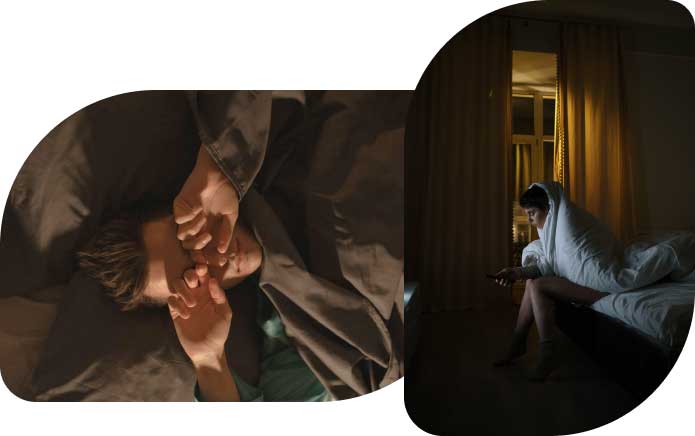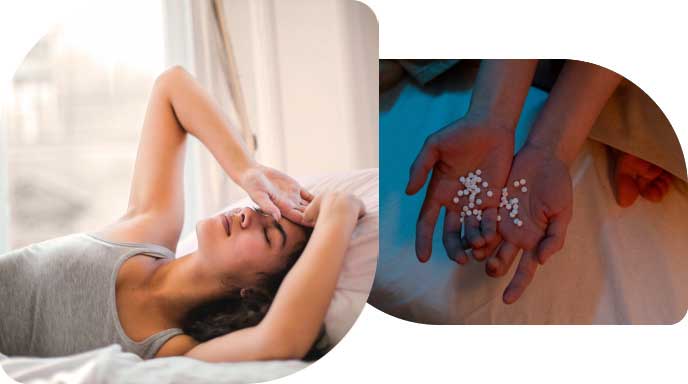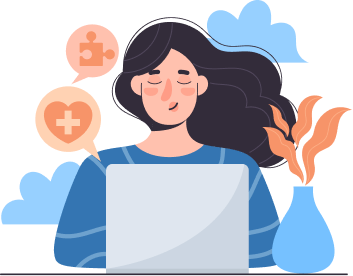The importance of sleep
Sleep is essential for both our physical and mental health. Sleep is restorative and allows for our body and mind to repair itself, recharge and optimize our overall functioning.

Sleep is essential for both our physical and mental health. Sleep is restorative and allows for our body and mind to repair itself, recharge and optimize our overall functioning.


A sleep disorder is a condition that frequently impacts your ability to get enough quality and restful sleep. Insomnia and other sleep disorders are one of the most common complaints in the world, and for many sleep problems, research has found that psychotherapy can be more effective than sleeping pills as it can help address the underlying symptoms, such as anxiety, stress, or depression, and without the unpleasant side effects or health concerns of sleep medication.
Cognitive Behavioral Therapy (CBT) is an evidence-based approach and is recommended as the first-line treatment for sleep problems and specifically insomnia. Here, CBT is a tailored approach that consists of various strategies including sleep hygiene, cognitive therapy, changing lifestyle habits and relaxation techniques to help improve your sleep and helping you develop healthy sleeping patterns for life.


Anxiety refers to conditions that are characterized by excessive fear and worry in response to stress, and related functioning disturbances, such as feeling on edge, frustration and an inability to control worrying thoughts.
Stress is the body’s reaction to any challenging or threatening event that it might experience, and which requires an adjustment or a response in order to cope.
Trauma is the result of an individual’s inability to process a traumatic event, and which takes a significant toll on the individual’s physiological, cognitive and emotional states, causing recurrent flashbacks, nightmares, intrusive memories, severe emotional distress and physical reactions.
Obsessive Compulsive Disorders (OCD) is a condition characterized by unwanted or intrusive and anxiety-provoking thoughts called obsessions, that often compel an individual to carry out repetitive actions, called compulsions, in order to reduce their anxiety. Common obsessive thoughts include a fear of contamination by germs or other contaminants, fear of harming oneself or others, and sexually explicit or violent images. While common compulsions include washing and cleaning, checking, repeating as well as mental compulsions.
Panic Attacks are characterized by having recurrent and unexpected episodes of intense fear accompanied by physiological symptoms that may include chest discomfort, heart palpitations, and shortness of breath.
Eating Disorders refers to a group of conditions that are characterized by abnormal eating habits associated with physical and/or psychological problems. These conditions are also characterized by a distorted body image, a preoccupation with food and an intense fear of gaining weight. The most common eating disorders include anorexia nervosa, bulimia nervosa and binge eating disorder.
Addictive Behaviors refers to conditions that are characterized by compulsive behaviors that may be related to substance abuse or engaging in a behavior despite it causing detrimental harm. Addictive behaviors include smoking, alcoholism, gambling, and even social media addiction.
Relationships & Family Issues refers to difficulties in maintaining relationships with family members, friends or partners.
Career Difficulties refers to difficulties in the workplace, including job satisfaction, performance or burnout.
Depression is a condition characterized by persistent feelings of sadness and loss of interest that interfere with daily functioning. Symptoms here include low mood, changes in appetite, disturbed sleep, feelings of hopelessness, social withdrawal and a loss of pleasure.
Mood Disturbances refers to a major change in an individual’s emotional state that lasts for a specific period of time and where the individual might experience periods of extremely elevated mood, depression, or both.
Adjustment Difficulties refers to emotional distress and difficulty in functioning in day-to-day life during a major stressor such as family conflicts, illness, divorce, breakups, unemployment or any other stressful event. Symptoms here might include depressed and anxious mood, irritability and inability to cope.
Phobia is a type of anxiety condition, characterized by a persistent, excessive and unrealistic fear of an object or situation. This includes specific phobia, such as airplanes or animals, social phobia, which is a persistent fear of being judged by others, and agoraphobia which refers to a fear of being in a situation where escape might not be possible.
Sleep Disturbances refers to sleep conditions that occur when the body’s internal clock is out of sync and which causes disturbances in the normal sleeping pattern and results in impairment in functioning.
Intimacy Concerns refers to sexual conditions that are defined by a significant disturbance in an individual’s sexual response, and which can affect desire, arousal, orgasm and pain. Common conditions here include erectile disorder, delayed ejaculation, premature ejaculation, female arousal disorder, compulsive sexual behavior (sexual addiction) and others.
Anger is an emotional state characterized by a physiological and cognitive response to a perceived threat and which triggers the body’s “flight or fight” response.
Parenting refers to the manner in which parents raise their children. Parenting practices share three major goals: ensuring children’s health and safety, equipping children for life as productive adults, and passing on cultural values. A healthy parent-child relationship is fundamental for a child’s physical, mental and emotional development.
Reach out to our customer care if you would like to inquire about other conditions

Answer a few questions on how you feel and your preferences

Get matched from a list of most suitable recommendations

Connect with a licensed therapist today!
Your session credits will not expire when your subscription ends. They will remain available for you to use at a later time. Cancel your subscription anytime. All prices are exclusive of 5% VAT.
My goal is to help you find clarity and develop confidence so you can move forward into a brighter future...
Our customer care team is happy to assist you with your inquires
Start your journey to feeling better today.
Use code CARE10 and get 10% off